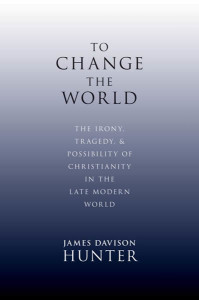
Today, the Gospel Coalition releases a free ebook that takes a look back at James Davison Hunter’s To Change the World five years later. I offer an ambitious essay both praising and critiquing the book:
This book is a unique and astonishing gift to the church. In spite of several tragic flaws that urgently need correction—we’ll get to those later—the book as a whole is not just brilliant but incredibly timely. It came at just the moment when the church most needed it.
I argue that Hunter has “awoken us from our dogmatic slumbers,” particularly from the assumption that to have a moral and coherent culture is something that is natural for human beings. It is not natural; it is supernatural.
We have become too comfortable in the world we are trying to change. We have lost the sense that a strong and moral culture is a miracle. In the presence of this miracle, we should be struck dumb with awe and wonder. In its absence, we should be humble and not demand it as an entitlement, any more than we demand as an entitlement the power to walk on water or raise the dead.
As always, your thoughts, comments, arguments, encouragements, dissents, rotten tomatoes, plaudits and withering scorn are all very welcome!




